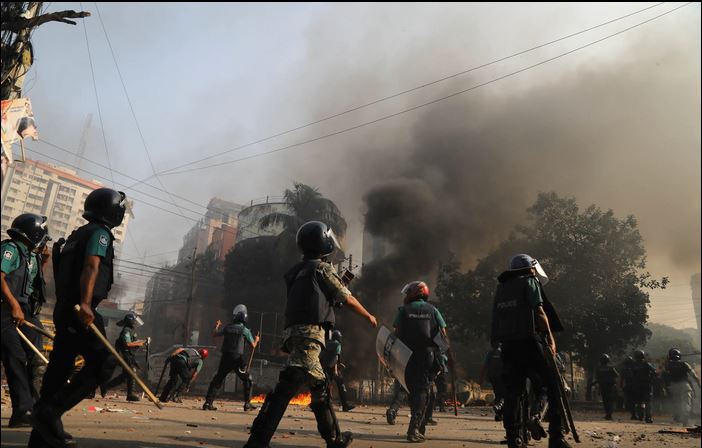DHAKA – Bangladesh has launched a sweeping and violent crackdown on opposition parties to “eliminate competition” ahead of general elections, including arresting almost 10,000 activists, Human Rights Watch said Monday.
As well as the thousands arrested, many from the key Bangladesh Nationalist Party (BNP), a staggering number also face charges. According to the BNP, about half of its five million members “face politically motivated prosecution”, HRW said. “The arrests, they are not leaving anyone behind, from senior level to the ground level,” one activist told HRW.
Prisons are now at more than double their capacity, the rights group said. The South Asian nation of around 170 million people holds a general election on January 7, with Prime Minister Sheikh Hasina eyeing her fourth consecutive term in power. The BNP and other parties have held mass protests calling on Hasina to quit power and let a neutral government run the polls, demands the government has said are unconstitutional.
“Bangladesh authorities are carrying out mass arrests of political opposition in a clear attempt to quash the opposition and eliminate competition ahead of the general elections”, HRW said. New York-based HRW, who called it a “violent autocratic crackdown”, said at least 16 people have been killed since protests escalated in October, including two police officers.
More than 5,500 people have been wounded.There was no immediate response by the government to the HRW report, but authorities say that those arrested should face justice for a range of violent crimes. The police, who have not said how many people they have arrested, accuse the opposition of torching nearly 290 vehicles, mostly buses, during nationwide strikes and transport blockades since October 29.Police said at least six people had been killed in the violence. – ‘Extrajudicial killings’ – HRW based its report on multiple witness interviews, as well as analysis of videos and police reports. It said it had found “evidence that security forces are responsible for using excessive force, mass arbitrary arrests, enforced disappearances, torture, and extrajudicial killings”.
Bangladesh is one of the world’s largest garment exporters — accounting for around 85 percent of its $55 billion in annual exports — with many global brands purchasing clothes from its factories.”Diplomatic partners should make clear that the crackdown will jeopardize economic cooperation”, HRW said. Julia Bleckner, senior Asia researcher at Human Rights Watch, said credible elections could not be held under such conditions.
“A free election is impossible when the government stifles free expression and systematically incapacitates the opposition, critics, and activists through arbitrary arrests, enforced disappearance, harassment, and intimidation,” Bleckner said. The BNP on Sunday said at least 16,625 members had been arrested since October. They include most of its leadership, most notably the BNP’s de facto chief Mirza Fakhrul Islam Alamgir.”Bangladesh has not seen such a massive crackdown on the opposition in the country’s history,” BNP spokesman A.K.M Wahiduzzaman told AFP. “A blanket of fear has spread all over the country”. – ‘Fearing arrest’ – Prosecutors and lawyers said in the past two weeks at least 526 BNP officials and activists were convicted and sentenced, mostly in absentia, over what the party said were “trumped up” charges.
Wahiduzzaman said that thousands of BNP members were now in hiding. Party officials said that when the police raided a house looking for them, they had beaten or arrested family members in their place. “Fearing arrest and torture, they’ve fled their homes,” he said. “Many are living on grain fields under open sky.”

